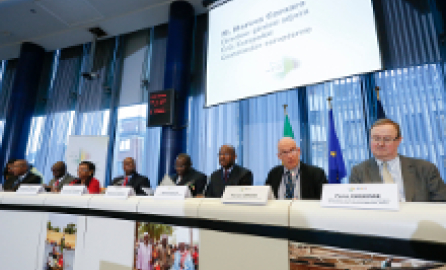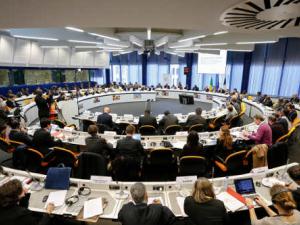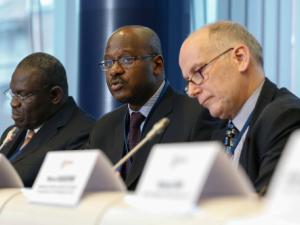Twelve months after French forces drove Islamic militants from northern Mali, a conference of international donors in Brussels has heard of progress, of socio-economic recovery, and reforms via decentralisation. Achievements include free elections, as well as ongoing efforts to combat corruption, improve the business climate, to promote a neutral and efficient justice system, and national reconciliation.
The second international follow-up meeting of the donors conference for development in Mali was held in Brussels on February 5, and allowed Malian ministers to report their progress to representatives from the EU, United Nations, African Union, Economic Community Of West African States (ECOWAS), West African Economic and Monetary Union (WAEMU), World Bank, International Monetary Fund, and donor governments.
Second International Follow-up Meeting of the Donor Conference for Development in Mali
“Despite the encouraging results we have achieved we are forced to acknowledge that challenges remain,” Malian Prime Minister, Oumar Tatam Ly, told the conference.
He said the government’s Sustainable Recovery Plan hoped to achieve economic and social transformation through improved security in the north, decentralisation of public institutions, reduced corruption and improved living conditions for the population of 16 million.
“It is clear that while not everything lies ahead, a lot remains to be done,” said Michel Reveyrand de Menton, the EU's special representative for the Sahel. “Nothing is resolved.”
Marcus Cornaro, Deputy Director-General for Development and Cooperation, said some organisations had questioned the need to meet so soon after the first conference in May 2013, where 55 countries pledged EUR 3.285 billion in assistance. However, he argued the Brussels conference was vital to maintain support for Mali amid more recent crises in South Sudan and the Central African Republic.
“We give the few committed people in the Malian leadership enough backing to carry through what remains an enormously fragile process,” Mr Cornaro said. “I would not call it babysitting the process but I think we need to partner-sit the process and really focus on it regularly and keep that level of commitment.”
Mr Cornaro said that without this timely follow-up meeting the World Bank would likely not have completed a comprehensive inventory of donors, pressuring some to firm up their commitment and allowing the Malian government to see the true amount of foreign assistance available.
The European Commission is contributing EUR 523 million. Almost the entire amount has been allocated, and EUR 238 million has already been paid, including EUR 120 million through budget support. This has allowed for:
- the government to timely start the recovery process;
- the provision of election observers who supported successful presidential and legislative elections last year;
- the redeployment of administration and social services in the North;
- and humanitarian aid reaching 900,000 people.
Mr Cornaro said: “Mali will stand out I hope also for the years to come as one of the first good precedents on combining European-led military intervention… with a large development agenda.”
Representatives of donor countries used the conference to question the Malian justice, reconciliation and finance ministers, including over concerns that negotiations with armed groups in the north have “stagnated”.
From left to right: Mohamed Ali Bathily, Justice Minister of Mali; Oumar Tatam Ly, Prime Minister of Mali; and Marcus Cornaro.
Cheick Oumar Diarrah, minister for national reconciliation and northern development, likened international comments about supposedly faltering peace talks to being told his house was on fire, “as if I was not aware that my house is burning.”
But Mr Diarrah said fewer media reports about peace negotiations did not mean the lines of communication were closed.
Justice Minister Mohamed Ali Bathily agreed, saying he had been in touch with the leader of one rebel group just days before flying to Brussels, and expressing confidence that those driven out by the French would eventually return peacefully.
Mr Bathily also addressed corruption, which he said had permeated all sectors of society. In response the government has established a new anti-corruption body, appointed more magistrates, and sought to stamp out cheating on the exam required to become a judge. Mr Bathily said six magistrates had been imprisoned following anti-corruption investigations.
According to MrCornaro, one “major breakthrough” was the way reports on corruption by the Auditor-General were now sent directly to the courts, ending a more convoluted earlier procedure that led to some findings being ignored.
The conference also discussed ways Mali could create more opportunities for economic growth, especially in the private sector.
MrCornaro said industries including agriculture (an under-utilised potential), cotton (“inefficiently subsidized”), gold (informalised and corrupted) and fishing (“ineffectively tapped”), could all be improved, and that small and medium sized businesses needed easier access to credit.
The parties are due to meet in Bamako this May, one year after the first conference was held.
This collaborative piece was drafted with input from Marie Molinie and with support from the capacity4dev.eu Coordination Team.




(1)
Log in with your EU Login account to post or comment on the platform.
Last May in Brussels a donors’ conference “for a new Mali” was organised by the European Union (EU) and France, in close collaboration with the Malian government. Given the complexity of the crisis and the strong involvement of African states and regional organisations (the Regional Economic Communities – RECs), what has been happening in this part of Africa is likely to impact on Europe-Africa relations for some time.
The crisis in Mali is a reality check and resent for Africa-Europe relations: it emphasised the role of influential member states over continental and regional organisations.
It triggered some reactions within the AU to ensure genuine African ownership of crisis response mechanisms.
The Africa-Europe relationship requires geographical differentiation and tailored approaches, not only in development aid.
For further information, this ECDPM note looks at the implications of the Malian crises for the relations between Africa and Europe, ahead of the next Africa-Europe summit in Brussels in April.
file:///Users/rw/Desktop/BN%2052%20The%20Mali%20crisis%20and%20Africa-Europe%20relations.pdf